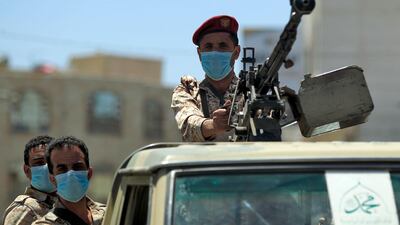Tuesday in Yemen marked five years since an Arab-led coalition intervened on behalf of the internationally recognised government to fight Houthi rebels.
The country's conflict was triggered when the Iran-backed Houthis overran Sanaa in September 2014 and attacked the government of Abdrabbu Mansour Hadi. Mr Hadi fled to Aden where his presidential compound was targeted repeatedly by Houthi fighter jets. On March 26 2015, a Saudi-led Arab Coalition, including the UAE and other allies, intervened to reinstate the government.
The rebels’ attempt to take over what was already the Arab world’s poorest nation has killed tens of thousands, with millions displaced and in need of aid.
Nearly 18 million people, including 9.2 million children, do not have regular access to safe water, according to the United Nations children’s agency, and only a third of the population has access to piped supplies. International aid agencies have said they may halt aid deliveries as they have been hindered by the Houthis.
Since 2015, the coalition has forced the Houthis out of much of the territory in the south and east but they still hold the capital Sanaa, territory along the Saudi border, and the Red Sea city of Hodeidah.
Various rounds of peace talks led by the UN have faltered over the years, including talks in Kuwait between April and August 2016, and the Stockholm consultations in December 2018.
For the past five years, the cities of Geneva, Biel, Kuwait and Stockholm have witnessed four rounds of consultations and one round of negotiations.
Since last year, Amman has become a centre for prisoner swap negotiations that also failed to progress.
New challenges continue to emerge.
The war has allowed a resurgence by Al Qaeda and ISIS in the security vacuum created in some areas of the country.
Now, Yemen is preparing to avoid another crisis. an outbreak of the novel coronavirus.
Yemen does not have any confirmed cases, but the Norwegian Refugee Council voiced fears on Tuesday that any outbreak could have catastrophic consequences for displaced families.
“We’re extremely concerned that on top of everything else, the possibility of coronavirus reaching Yemen will have devastating consequences for an already overstretched health system and vulnerable population," said its Yemen director, Mohammed Abd.
"Five years of war have crippled Yemen’s ability to respond to any outbreak and it is now a race against time to prepare."
Government officials say the rebels are exploiting the virus to increase the suffering of ordinary Yemenis.
“We urge the World Health Organisation and Unicef to improve efficiency of health system and supervise the process in areas controlled by Houthis militia,” Yemen’s Minister of Information, Muammar Al Eryani, said on Twitter.
“The [Houthi] militia that stole food from the mouths of millions of hungry people to finance war effort should not entrusted with any measures to confront a global epidemic."


